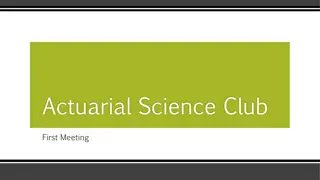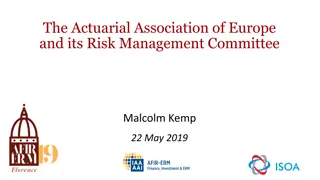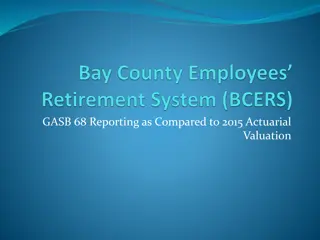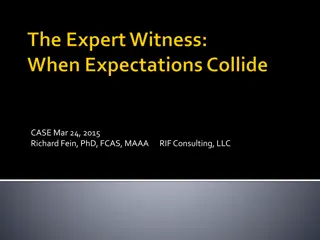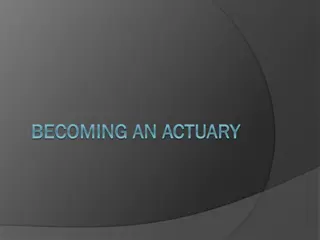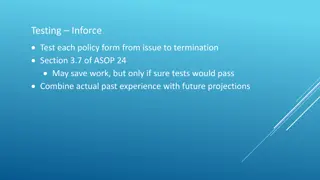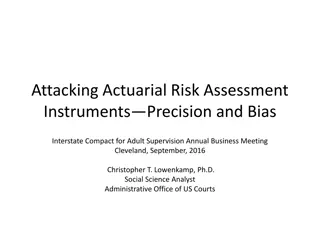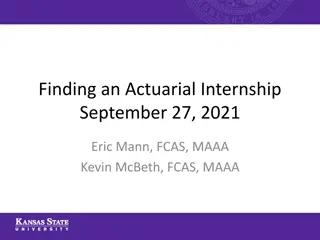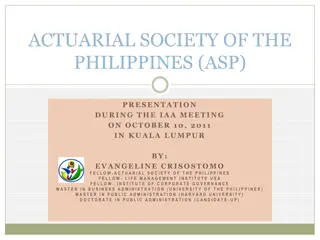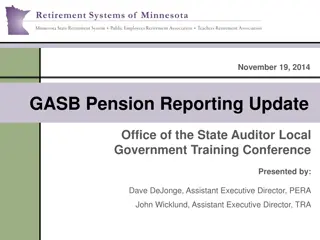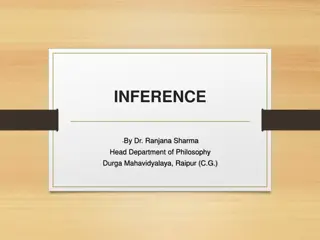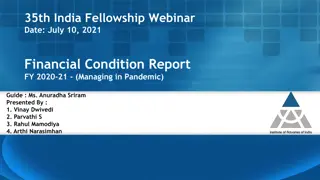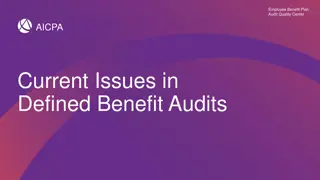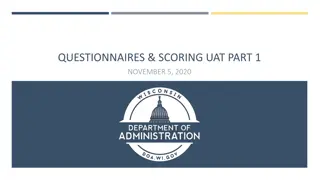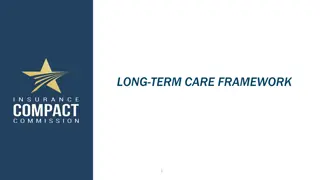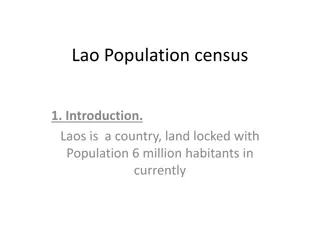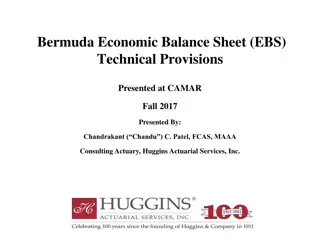Actuarial Science Major Information Session at SMU
The Actuarial Science Major Information Session at SMU is an opportunity for students interested in mathematics and careers in actuary, finance, insurance, and risk management. The program offers two tracks - Actuarial Analyst (AA) and Risk Analyst (RA) - structured after the education framework of the Society of Actuaries. The session covers professional paths, where actuaries and risk analysts work, and the compulsory courses for each track. Join the session to learn more about this exciting field.
Download Presentation

Please find below an Image/Link to download the presentation.
The content on the website is provided AS IS for your information and personal use only. It may not be sold, licensed, or shared on other websites without obtaining consent from the author. Download presentation by click this link. If you encounter any issues during the download, it is possible that the publisher has removed the file from their server.
E N D
Presentation Transcript
Actuarial Science (ACS) Major Information Session Hosts: Professor Tse Yiu Kuen, PhD, FSA Education Professor Kwong Koon Shing, PhD, FSA, CERA Invited Speakers: Eng Pingni, FSA, CERA, Milliman Lu Zihao, Tokio Marine Asia Time: Sept 15, Thurs, 3:30 5:00 pm Venue: SOSS/SOE SR2.1
Summary A second major open to all students in SMU, offered by SOE For students with interest in mathematics and a career in actuary, finance, insurance and risk management Structured after the education framework of the Society of Actuaries Two tracks: Actuarial analyst (AA) track Risk analyst (RA) track
Where does an actuary work? insurance industry, in life insurance, nonlife insurance (health, casualty, property and liability) and reinsurance companies consulting firms government insurance department (MAS) Professional path: ASA, FSA Where does a risk analyst/manager work? insurance companies banks and financial institutions consulting firms health care, transport, manufacturing industries, etc Professional path: CERA
Compulsory courses for AA track 1. 2. 3. 4. 5. 6. 7. 8. 9. 10. STAT 311 Risk Theory and Loss Models or FNCE 305 Analysis of Derivative Securities 11. ACCT 101/111 Financial Accounting 12. FNCE 101 Finance 13. FNCE 102 Financial Instruments, Institutions and Markets or FNCE 201 Corporate Finance STAT 101 Introductory Statistics or STAT 151 Introduction to Statistical Theory STAT 201 Probability Theory and Applications STAT 203 Financial Mathematics ECON 205 Intermediate Mathematics for Economics ECON 101 Intermediate Microeconomics ECON 102 Intermediate Macroeconomics ECON 107 Introduction to Econometrics ECON 207 Intermediate Econometrics or ECON 233 Economic Forecasting STAT 310 Life Contingent Risks
Compulsory courses for RA track 1. 2. 3. 4. 5. 6. 7. 8. 9. 10. ACCT 101/111 Financial Accounting 11. FNCE 101 Finance 12. FNCE 102 Financial Instruments, Institutions and Markets or FNCE 201 Corporate Finance STAT 101 Introductory Statistics or STAT 151 Introduction to Statistical Theory STAT 201 Probability Theory and Applications STAT 203 Financial Mathematics ECON 205 Intermediate Mathematics for Economics ECON 101 Intermediate Microeconomics B ECON 102 Intermediate Macroeconomics B FNCE 305 Analysis of Derivative Securities or STAT 310 Life Contingent Risks STAT 311 Risk Theory and Loss Models STAT313 Quantitative Risk Analysis
How many courses do you need to do to complete the ACS major? For students in Admit Year 2015-2016 onwards: If you are a BSc (Econ) student, the min is 38. If you are a BBM (FNCE) student, the min is: 39 for AA track and 38 for RA track.


